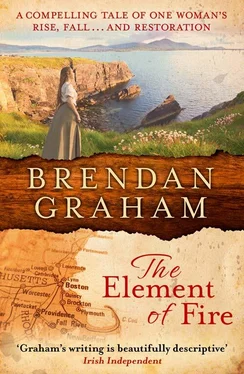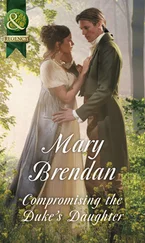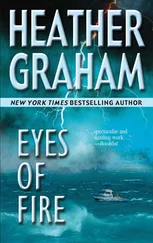‘Mr Reid! Mr Reid!’ she shouted, money in her fist, shaking it above her head. ‘Passage for four to Boston!’ she beseeched.
At last he beckoned her forward, she banged down the money onto his desk.
Fifteen minutes later she left, four sailing tickets to Boston clenched like a prayer between her two hands.
Their passage was secured.
The children were overjoyed, Mary more restrained than the others, at the thought of leaving Katie behind. Ellen wondered if the silent girl really understood what all the excitement was about. Sometimes, you just didn’t know with her. But the girl clapped her hands, looking from one to the other of them, her hazel-brown eyes shining, her pert little nose twitching with delight.
Thrice daily, morning, noon, and at eventide, Ellen went to check on the Jeanie Goodnight lest the ship slip out again unexpectedly, just as she had ghosted into the western seaboard town.
Three days later they were headed out into the bay, Westport behind them in the mist, like a shaken shroud. She hated the place. Its workhouse which had taken Michael; the hordes of its hungry, clawing to get aboard the ship ahead of her, the lucky ones, their passage paid by land-clearing landlords.
Once aboard, she had changed her clothes, shaking the stench of Ireland out of them, then boiled them. As the Jeanie Goodnight threaded its way through the drumlin-humped islands, she was aware of the Reek to her left, the cursed mountain always looking down on them, whichever way you went, by land or by sea; watching, judging. She wouldn’t look at it directly. It was part of the Ireland of the past drawing away behind them. An Ireland of Famine; of vacant faces and outstretched hands – an island of beggars, no place for her and her children.
There they had been, she, Michael, all of them, back there in the mountains, waiting, year in year out, for the potatoes to grow. Beating their way down the road to the priest to give thanks, prostrating themselves, when they did grow; beating their breasts in contrition for imagined sins when they didn’t. Then, trudging over and back to Pakenham’s place to pay the rent, hoping he wouldn’t raise it on them when they had it, grovelling for clemency, citing ‘the better times to come’ when they hadn’t.
Always on their knees, giving thanks or pleading. They were to be pitied, the whole hopeless lot of them. It wasn’t the mountains of Maamtrasna that imprisoned them, or the watery arms of the Mask that landlocked them. It wasn’t even, she knew, the landlords and the priests. It was themselves. Going round in circles, beholden to the present and beholden to the past, with its old seafóideach customs, handed down from generation to generation. Tradition, woven around their lives from before they were born, like some giant web. She wanted to strip it all away from her now, never return. If it wasn’t for Michael and Katie back there on its bare-acred mountain, in its useless soil.
‘A Mhamaí …’ The tug at her sleeve startled her.
It was Mary. The child’s eyes, though dry, were blotched from rubbing. Mary would try to hide it from her that she still cried over Katie. That was her way. In the days they had waited for the ship, Ellen had talked to her and Patrick about the need to be strong; the child now beside her looked anything but. Though her first instinct was to take Mary in her arms, Ellen instead led her to the bow of the ship.
‘See, Mary! See out there beyond the horizon – the place where the sea meets the sky?’
Mary nodded.
‘Well, out there is America
‘Is it like Ireland?’ Mary interrupted.
‘No, Mary, it isn’t. America is a big and rich country not like Ireland at all.’
Mary fell silent. Ellen, sensing the child’s disappointment, pressed on. ‘It will be better than Ireland, Mary, I promise you it will be better. But we are going to have to be Americans. We must forget we are Irish. Leave all … all that behind us.’
Mary turned from looking out ahead, trying to see this land where they would be different people. ‘But, a Mhamaí –’
Ellen stopped her, gently. ‘Mary … you mustn’t call me that – “ a Mhamaí ” – any more. We are going to be Americans now. People don’t say that in America. From now on you must call me “Mother”!’
The child said nothing – only looked at her.
‘It’s all right,’ Ellen said, taking her by the shoulders. ‘Nothing’s changed. We’re still the same between us in English as in Irish,’ she smiled. ‘Do you understand?’
Mary once more looked out between the deepening sky and the widening ocean, trying to see beyond where they met. Out to this place, this America.
‘Yes … Mother,’ she answered, giving voice to the strange-sounding word – the wind from America holding it back in her throat, so that Ellen could scarcely catch it.
Out they tacked, past the Clare Island lighthouse, tall and solid-walled. Its white-painted watchtower, lofted heavenwards two hundred feet, would see them safely past Achill Sound. ‘A graveyard for ships,’ Lavelle had told her before she had left Boston. It was his place, Achill. This island, cut off from Ireland’s most westerly shore. ‘Achill – wanting to be in America,’ he always joked.
She hadn’t yet broached the subject of Lavelle with the children, except in a general fashion, like she had mentioned Peabody; both as people in Boston with whom she conducted business dealings. She would have to tell them more about Lavelle – that they were partners, but in business matters only. Albeit that she was fully conscious of his affection for her, and in turn regarded him highly, it was her intention never to remarry. She would be true to Michael to the grave. If, thereby, she was denying herself the tender comforts of marriage life, and a father’s guiding hand for her children, then so be it. That was the price to be paid of her troth to Michael.
An eddy of breeze swirling up from Achill Sound made her shiver slightly. She loosened then re-knotted the blue-green scarf Lavelle had given her at Christmas. She had four long weeks at sea in which to reaffirm her intentions.
The Jeanie Goodnight , a triple-masted emigrant barque, with burthen eight hundred tons, and a master and crew of nineteen, was constructed of the best oak and pine Canadian woods could yield. On her arrival at Westport she had disgorged four hundred tons of Indian corn, twelve hundred bags of the dreaded yellow meal; flour, Canadian timber and East Coast American potatoes. There had been a riot, the poor seeking to seize what supplies arrived with the ship. It was the only way they would get food, by taking it.
When Patrick raised the question of inferior food being shipped into the country crossing with superior food being shipped out, all she could say was, ‘It doesn’t make any more sense to me, Patrick, than it does to you. I don’t understand these things.’ It really didn’t matter what food there was, good or bad. The famished had scarcely a penny between them with which to buy it anyway.
Soon they had sailed beyond the reach of Achill Sound, leaving behind her last view of Ireland – disused lazy beds climbing towards the sky over Clew Bay.
The voyage was a good one, the elements favouring them so that the copper-fastened Jeanie Goodnight sat steady and proud in Atlantic waters. Ellen kept themselves to themselves. Their fellow passengers were a mixed lot. Above deck were the commercial Catholic classes – shopkeepers, grocers, middlemen – and those called ‘strong farmers’, taking what possessions they had, fleeing the sinking ship that was Ireland. There was too a good sprinkling of voyagers from Londonderry and the northern counties.
Читать дальше












